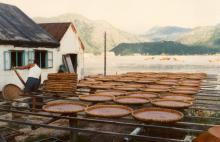Dutch banker Jacobus van der Laan has finally been sent from the Sun Wah Hotel to Stanley. Today he writes his first letter from camp, addressed to his parents-in-law and his daughter:
Dear Daddy, Mammy, Guillaumine and everybody,
How are you all since our last letter. We hope that you can manage and that circumstances are not too difficult. We are in good health and have a very quiet life since our work has been finished last week ((He'd been kept out of Stanley to help liquidate his bank, the Netherlands Trading Society.)) It is a great advantage that we can have a swim and lots of fresh air here. So far we did not receive any news from you but as one of the employees got a letter from his parents at home we know that you must have received our various postcards etc. as well.
The second meeting of the Hong Kong Fellowship is held at the Queen Mary Hall, Y. W. C. A., Great Russell Street, London. The President, Lt.-General A. E. Grasset is in the chair and between five to six hundred members are present.
The chairman begins by reading a message from the Queen dated July 16:
The anxieties of those whose dearly loved relatives are interned in the Far East are very often in the Queen’s mind, and the opportunities provided by the Fellowship of sharing experience and information will, Her Majesty is sure, be most truly welcomed.
I am to say how thankful the Queen is to learn that a large consignment of letters and postcards from Japan and Hong Kong has lately reached this country.
Lt-General Grasset went on to say that the meeting was taking place in much happier circumstances than the last – reassuring reports about civilian internees and a considerable quantity of mail from POWs had come in since that date, and all the letters pointed to high morale. The main anxiety of the prisoners was that those at home shouldn’t worry too much.
Miss Warner spoke about Stanley Camp and praised the ‘wonderful work {that} had been done by Dr. Selwyn Clarke (sic) as head of the Medical Dept. An Informal Welfare Committee had been formed and had done much to keep up the standard of health, which had been ‘remarkably good’.
In reply to a question, Colonel Cole spoke about repatriation. He said that the Japanese wouldn’t allow any males but the very sick to leave Hong Kong, but that about 300 women, children and invalids from Hong Kong would be brought home as part of a general Asian swap of about 1600 people on each side.
Tea was provided at a small charge by the Y.W.C.A. and afterwards some repatriated Stanley internees held an informal gathering in the lounge and passed on information about conditions in Camp up to the time of their departure.
Sources:
Full text of the Van der Laan letter at: David Tett, Captives in Cathay, 2007, 322
HKF: The Hong Kong Fellowship Newsletter, October 1943, No. 3, pages 1-4
Note:
It looks as if Miss Warner thought Dr. Selwyn-Clarke was in Stanley. He was never in Camp, but remained carrying out work in Hong Kong while living in the French Hospital, and had was arrested on May 2, 1943. Her comments suggest that news of this arrest was not general knowledge in London by July even amongst those with a special interest in Hong Kong.

